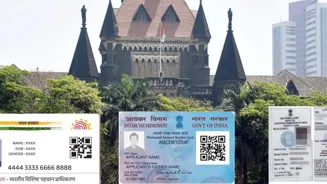The Bombay High Court on Tuesday said that a person does not become a citizen of India merely by possessing documents like an Aadhaar card, PAN card, or a voter ID.
While refusing bail to an alleged Bangladeshi
man for entering India illegally, a bench of Justice Amit Borkar provisions of the Citizenship Act lay down who can be a citizen of India and how citizenship can be acquired, and documents such as the Aadhaar card, PAN card and EPIC are only meant for identification or availing services, news agency PTI reported.
“Merely having documents such as Aadhaar card, PAN card or voter ID does not, by itself, make someone a citizen of India. These documents are meant for identification or availing services, but they do not override the basic legal requirements of citizenship as prescribed in the Citizenship Act,” the High Court said.
The man, identified as Babu Abdul Ruf Sardar, is accused of entering India without a valid passport or travel documents. Sardar, believed to be a Bangladeshi national, stayed here for over a decade by procuring forged documents such as Aadhaar card, PAN card, voter ID and an Indian passport.
The single-judge bench further noted that the Citizenship Act, passed by the Parliament in 1955, created a permanent and complete system for acquiring citizenship.
“In my opinion, the Citizenship Act of 1955 is the main and controlling law for deciding questions about nationality in India today. This is the statute that lays down who can be a citizen, how citizenship can be acquired and in what situations it can be lost,” Justice Bokar said as quoted by the news agency.
The bench further emphasised that the 1955 law draws a clear line between lawful citizens and illegal migrants, the bench said. People falling in the category of illegal migrants are barred from obtaining citizenship through most of the legal routes mentioned in the Citizenship Act, it added.
“This distinction is important because it protects the sovereignty of the country and ensures that benefits and rights meant for citizens are not wrongfully taken by those who have no legal status to stay in India,” the court said.
Refusing bail to the accused Sardar, the court pointed out that verification of his documents was still pending, and the investigation was ongoing. The police’s concern that he may abscond if released was found to be “a genuine apprehension”.
The bench said the allegations went beyond unauthorised stay in India, involving “making and using fake and forged identity documents with the aim of pretending to be an Indian citizen”.
Sardar was booked under provisions of the Bharatiya Nyaya Sanhita, the Passport (Entry to India) Act and the Foreigners Order.
(With inputs from PTI)














